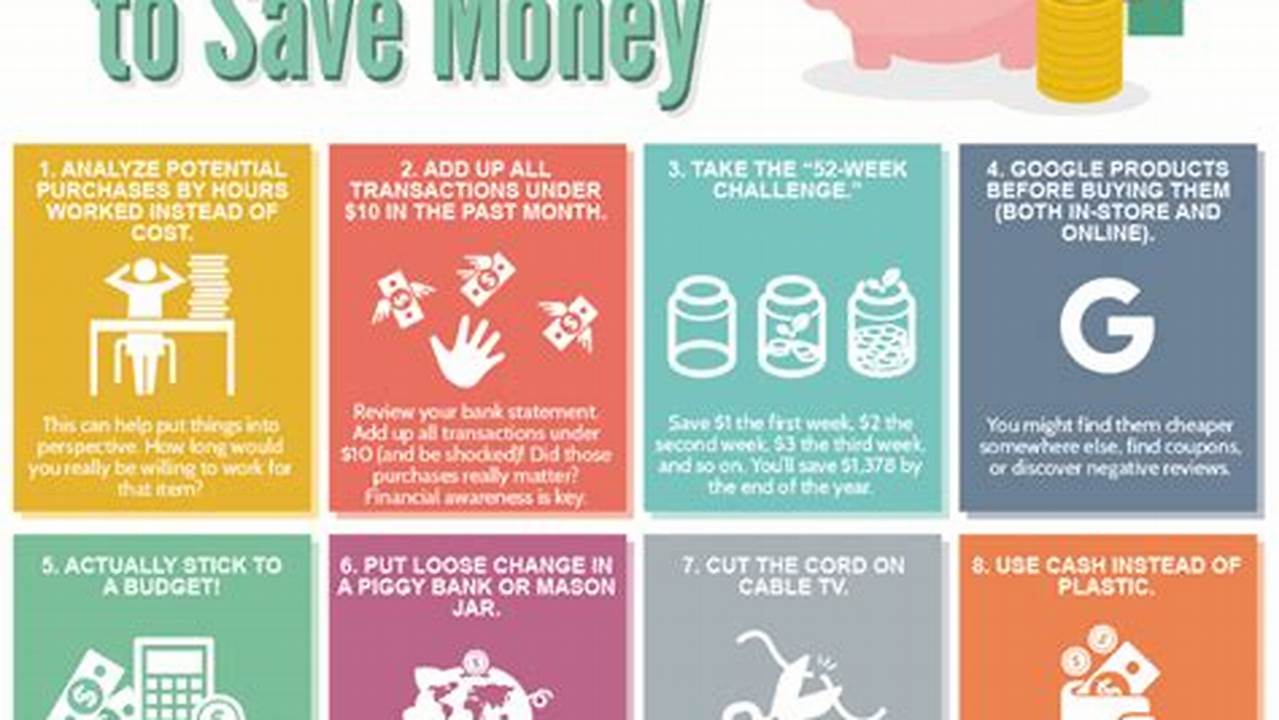
Saving money at home involves implementing strategies to reduce household expenses and increase financial security. It encompasses various techniques, such as cutting unnecessary costs, optimizing energy consumption, and exploring alternative ways to fulfill needs.
Saving money at home is crucial for several reasons. Firstly, it allows individuals to accumulate wealth for future goals, such as purchasing a home, funding education, or retiring comfortably. Secondly, it reduces financial stress and provides a sense of financial stability. Thirdly, it promotes responsible spending habits and encourages individuals to make informed financial decisions.
To effectively save money at home, numerous strategies can be employed. These include creating a budget to track income and expenses, identifying areas where spending can be reduced, negotiating lower bills for utilities and services, and exploring ways to generate additional income through side hustles or hobbies.
Frequently Asked Questions
This section addresses common questions and misconceptions related to saving money at home.
Question 1: Is it possible to save money at home without making major sacrifices?
Answer: Yes, saving money at home does not require drastic lifestyle changes. Small adjustments, such as reducing unnecessary expenses, optimizing energy consumption, and exploring alternative ways to fulfill needs, can lead to significant savings over time.
Question 2: What are some effective ways to cut down on household expenses?
Answer: Creating a budget, identifying areas where spending can be reduced, negotiating lower bills for utilities and services, and exploring ways to generate additional income are all effective strategies for cutting down on household expenses.
Question 3: Is it better to save money in a bank or invest it?
Answer: The decision of whether to save money in a bank or invest it depends on individual circumstances and financial goals. Banks typically offer lower returns but also lower risk, while investments have the potential for higher returns but also carry higher risk.
Question 4: How can I stay motivated to save money?
Answer: Setting realistic savings goals, tracking progress, and rewarding oneself for milestones can help stay motivated to save money.
Question 5: What are some common mistakes to avoid when saving money at home?
Answer: Common mistakes to avoid include not creating a budget, failing to track expenses, and giving up too easily. It is important to approach saving money with a realistic plan and a commitment to making gradual but consistent changes.
Question 6: How can I teach my children about saving money?
Answer: Teaching children about saving money involves setting a good example, providing opportunities for them to earn and save money, and explaining the importance of financial responsibility.
In summary, saving money at home requires a combination of planning, discipline, and smart financial choices. By implementing effective strategies and avoiding common pitfalls, individuals can achieve their financial goals and improve their overall financial well-being.
Tips to Save Money at Home
Implementing strategies to save money at home can lead to significant financial benefits. Here are some practical tips to help you get started:
Tip 1: Create a Budget
Creating a budget is essential for tracking income and expenses. This allows you to identify areas where spending can be reduced and prioritize essential expenses.
Tip 2: Reduce Unnecessary Expenses
Review your expenses and identify areas where you can cut back. This could include reducing entertainment costs, dining out less frequently, or switching to a more affordable mobile phone plan.
Tip 3: Negotiate Lower Bills
Contact service providers for utilities, insurance, and other services to negotiate lower bills. Politely inquire about discounts or promotions that may be available.
Tip 4: Optimize Energy Consumption
Simple changes such as turning off lights when leaving a room, unplugging electronics when not in use, and using energy-efficient appliances can lead to significant savings on energy bills.
Tip 5: Explore Alternative Ways to Fulfill Needs
Consider alternative ways to fulfill needs without spending money. For example, instead of buying new clothes, try borrowing from friends or shopping at thrift stores.
Tip 6: Generate Additional Income
Explore ways to generate additional income through side hustles, hobbies, or part-time work. This can supplement your regular income and provide extra funds for savings.
Tip 7: Take Advantage of Free Resources
Utilize free resources such as community centers, libraries, and online platforms to access entertainment, education, and other services without spending money.
Tip 8: Cook Meals at Home
Eating out can be expensive. Cooking meals at home allows you to control ingredients and portion sizes, leading to healthier and more affordable meals.
SummarySaving money at home requires planning, discipline, and smart financial choices. By implementing these tips, you can reduce expenses, increase savings, and improve your overall financial well-being.
Conclusion
Saving money at home requires a combination of planning, discipline, and smart financial choices. By implementing effective strategies, individuals can reduce expenses, increase savings, and improve their overall financial well-being.
Remember, saving money is a journey, not a destination. It requires ongoing effort and a commitment to making gradual but consistent changes. By embracing the tips and strategies outlined in this article, you can take control of your finances and achieve your financial goals.
